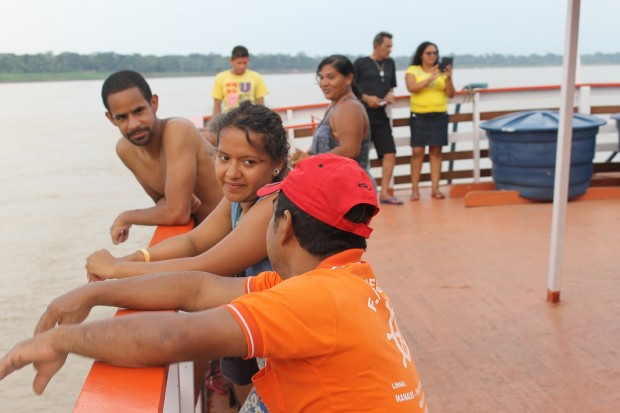
River transport in Brazil’s Amazon region is both an essential means of getting around for locals and an unforgettable experience for travellers. And with a unique sense of river camaraderie, it’s hard to feel lonely. In search of adventure, Sam Cowie took the slow boat from Manaus to Porto Velho.
By Sam Cowie
Manaus
Spending four days on a boat slowly chugging its way down the Amazon is probably not for everyone. For some, sharing a relatively small space with 100 strangers – a fair few of whom are young children – in humid heat, with only two bathrooms, set meals, limited electricity and zero privacy would be a nightmare.
For many Amazonians, however, long distance river transport is unavoidable, as much of the region is unreachable by road and air travel is often prohibitively expensive. Around 14 million passengers used Amazon river transport in 2012, many travelling distances of up to 1600km. Thirty per cent of them earned between R$450 and R$720 a month.
Personally, I found lying in a hammock with no internet and little more to do than read a book or stare at the scenery rolling by an extremely pleasant break from Brazil’s wonderful, but at times stuffy and hectic, metropolises.
After being on assignment in Manaus one of my few ways out of the city without catching a plane was to take a boat to Porto Velho in neighbouring Rondônia, which has the dubious honour of being Brazil’s most deforested state. A highway connecting the two cities was built in 1973 by the then military government, but fell into disrepair shortly afterwards. Today all that remains is a dirt road.
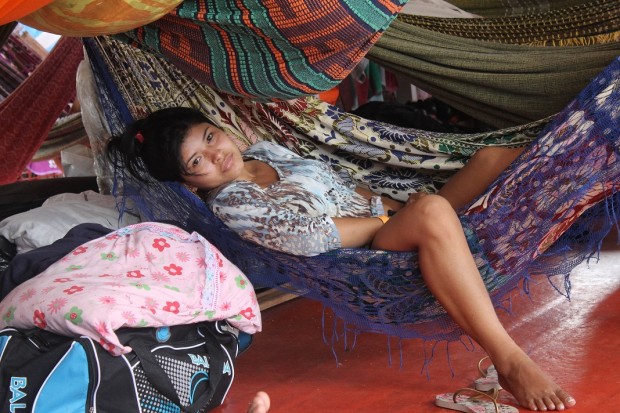
A four day ticket to Porto Velho, including drinking water and three meals a day, costs R$200 (U$52), about three times cheaper than the one hour plane flight. I arrived at the boat a few hours before we set sail and, finding few remaining spaces, set up my hammock in a corner next to a cheerful 70-year-old Afro-Brazilian woman, travelling to Porto Velho to collect her older sister who had fallen ill while visiting relatives.
Sometime after sunset the engine roared to life and, with the sky lit up by lightning from a dry tropical storm, we made way our way down the Rio Negro towards the Amazon, passing flaming gas refineries and the bright lights of the famous Manaus free trade zone.
Lights on the boat go out around 10pm, perhaps because the day begins at 6am when the crew, a surly bunch of few words and even fewer smiles, serve up sickeningly sweet coffee and buttery crackers for breakfast. The lunches and dinners are, perhaps surprisingly, tasty and satisfying, roughly equivalent to what you’d expect to find at a decent worker’s restaurant in down São Paulo or Rio.
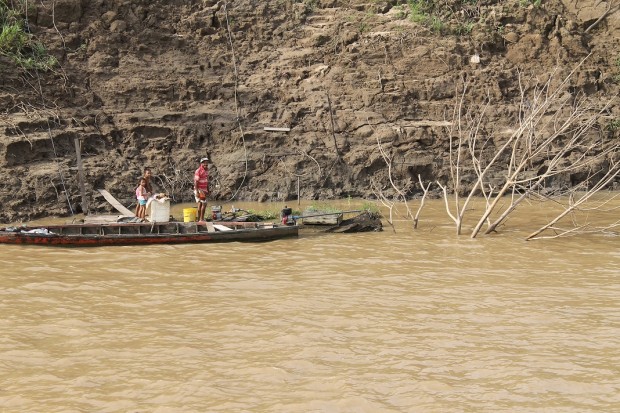
The landscape is green and lush, and towering trees and muddy banks slide by as the boat slowly makes its way down river, passing small villages, hut-sized Evangelical churches, herds of horned Amazon buffalo, and fishermen waving from rickety canoes as they pull in their catch.
It doesn’t take long to make friends and very quickly I met a bunch of good-natured, larger than life characters. One of my favourites was “Repeteco”, an 80-year-old forró (traditional folk music from the north east of Brazil) composer from Pernambuco travelling to Porto Velho with 800 copies of his latest CD to sell. Under the circumstances, I could hardly refuse to buy one.
As the days drift by, living with people in such close quarters allows me to witness first-hand the famous, if somewhat cliched, “Brazilian warmth” that one hears so much about. Almost everyone is open, friendly and generous – sharing things like fruit and sweets – as well as respectful of what minuscule privacy their fellow passengers have.
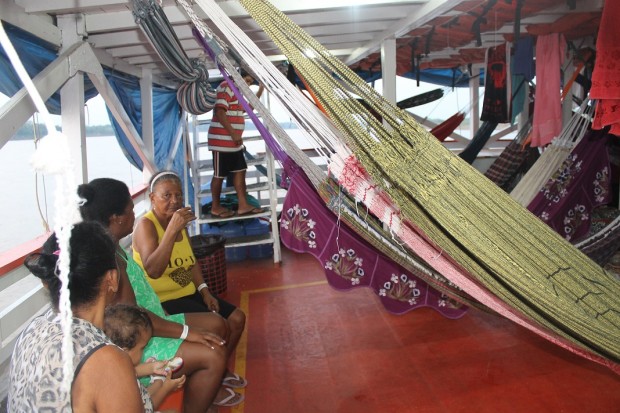
Alongside the Brazilians there was a relatively large contingent of passengers from other Latin American nations on board, including an Ecuadorian juggler, a Paraguayan missionary and Felipe, a 26-year-old Venezuelan history teacher, who was leaving home to start a new life in Uruguay. There were also groups of backpackers from Mexico and Peru. The only other “authentic” gringo on board was Giles, a Canadian in his late sixties who was on a long distance motorcycle trip.
Further down river, the landscape becomes more arid, the brown banks turn golden and there are more sightings – or rather blink and you miss it glimpses – of leaping river dolphins and alligators.
While the largely unvarying scenery is not perhaps truly breathtaking, there is something about the sheer degree of isolation, combined with the relentless flow of the river, that carries the mind to a place far removed from city life. As I sit and stare and at the passing villages, I try to figure out what it would be like to live in the region, a feeling summed up nicely in this article in The New York Times.
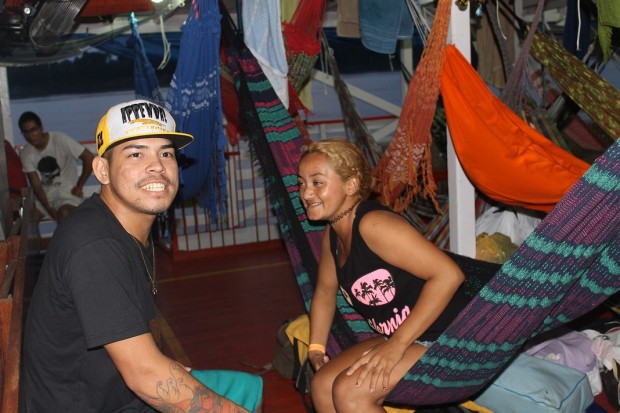
At night, the top deck fills up with people, some enjoying an evening beer as the forró and brega (cheesy Brazilian pop) music pumps from a loudspeaker. Most nights I play cards with a pair of factory workers from the Manaus free trade zone.
Among the other passengers was Kelly, 21, who was taking a two month holiday with her young daughter to see an aunt in Minas Gerais. Gilberto, 34, meanwhile, lived in Manaus in free lodgings provided by the soft drink factory where he worked, and was returning home to Porto Velho for a three week holiday, something he did every three months.
Each night the lone TV showed novelas, Brazil club football or DVD films. Most passengers though, were content to simply sit on plastic stools, talking and gazing out into the darkness or up at the piercingly bright stars.
“It’s as if you could reach out and grab one,” said Claudio, a carioca in his mid-forties, who was sleeping in a tent on the top deck, on his way home after a cycling tour of South America. He had caught dengue fever in Colombia and now, with no money and too sick to cycle back, had to present his medical certificate at the council offices of each town we stopped in to have his transport paid.
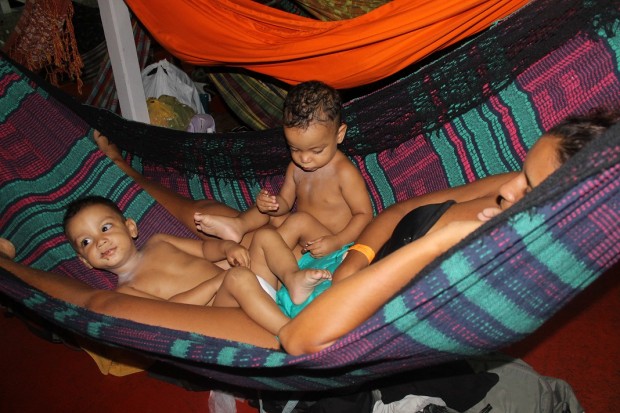
Word spread that the boat would be docking for three hours at Humaitá, where we would have the option of disembarking and taking a two hour drive to Porto Velho, or staying on the boat for another twenty four hours until we reached our final destination. Due to previous commitments rather than any frustrations with the trip, I decided to take the first option.
To say there was a party on the final night would be a considerable overstatement, but there were more people than usual out on the top deck, and something of a “grand finale” atmosphere. Some of the passengers even seemed to have dressed up for the occasion.
I sat with a pair of cable TV technicians who were traveling between cities looking for work. As we chatted they sipped on cachaça mixed with Fanta and played pagode (another type of Brazilian pop music) tracks on their cell phones. Eventually, exhausted, I crept downstairs to negotiate the dark maze of hammocks before falling into my own bed, the engine throbbing loudly in the background.
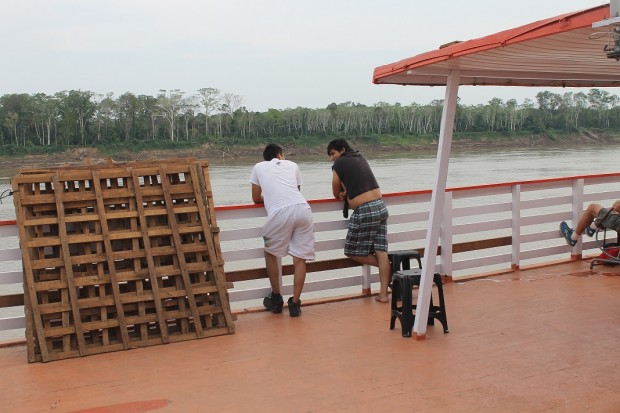
We finally arrived in Humaitá at 3am on Saturday morning, where I bid farewell to my newfound friends. The sense of river camaraderie wasn’t over yet, however, as I jumped in a taxi to Porto Velho – shared, of course, with a group of my fellow passengers.

